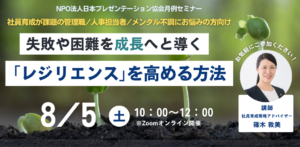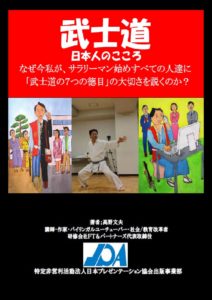プレゼン最前線2023年7月15日号
NPO日本プレゼンテーション協会理事長 高野文夫
整理番号163冊目の本
Bushido(The spirit of Japanese)
英語版
6月と7月には武士道の本がそれぞれ出版になります。
日本語版と英語版です。
今月のプレゼン最前線では英語版の内容の続きをご紹介をさせて頂きます。

1、Why do I emphasize the importance of the “Seven moral code of Samurai” to all individuals, including salaried workers?
Although it may sound repetitive, I will explain it once again.
Even my fellow martial artists recoil when the term “Bushido” is mentioned.
Even those immersed in the world of martial arts seem disconnected from Bushido, lacking an understanding of its essence.
Both martial arts and sports fail to distinguish between the two.
This is evidence of the influence of a culture tainted by Western biases, a culture centered around winning and losing, and personal gain.
So, what values does Bushido hold?
The seven virtues, the beautiful principles underlying the way of Bushido deeply rooted in the Japanese people,
are the values that, if we reassess and internalize, will undoubtedly lead us to a successful life.
That is what I want to convey.
Yes! I want Bushido to be reconsidered as a philosophy of success and as a law of attracting happiness.
Why? Because those who have achieved success as salaried workers, occupying positions such as department heads,
executives, and company presidents, have gained a certain level of respect and have, to some extent, embodied the seven moral code of Bushido.
The Meiji Restoration was accomplished through the embodiment of Bushido, nothing else.
Since then, the samurai class was abolished, but it became ingrained as the moral code of the entire nation.
After the defeat in World War II, it has certainly been gradually lost. However, it still remains as the essence of the Japanese spirit and serves as the spiritual backbone of the Japanese people.
The seven principles of Bushido, these form the core of Bushido.
2,Seven moral code of Samurai:
-
Jin (Love and Sympathy)
-
Gi (Truth and Justice)
-
Rei (Courtesy)
-
Chi (Wisdom)
-
Shin (Faith)
-
Chuu (Loyalty)
-
Sei (Promise)
These seven virtues have been cherished as guiding principles for the actions of the Japanese people.
However, since the Meiji Restoration, they have been corrupted by a culture that seeks efficiency and effectiveness.
Furthermore, intentionally undermined as part of the American policy to weaken Japan after World War II.
3,GHQ Occupation Policy and Japanese Budo
After Japan’s defeat in the Greater East Asia War (commonly known as the Pacific War in post-war education),
traditional martial arts in Japan, including Jujutsu, Judo, Karate, Kendo, and other sports martial arts,
were completely and strictly prohibited during the period of occupation by the Allied Powers,
specifically the General Headquarters (GHQ) of the victorious United States.
GHQ, as you may know, stands for General Headquarters of the Allied Powers, referred to as the “Allied Occupation Forces” in the Potsdam Declaration.
The occupation policies devised by GHQ can be summarized as the so-called “3R, 5D, 3S” policy,
which was a frightening set of measures that can be described as a form of “policy of subduing the people.”
<3R>
Revenge (Seeking revenge and retaliation against Japan, the nation that dared to challenge the white powers)
Reform (Transforming Japan into a country that serves the interests of the United States)
Revive (Reviving Japan as a vassal state of the United States)
<5D>
Disarmament (Disarming the nation) Demilitarization (Promoting demilitarization) Decentralization (Dismantling the zaibatsu, powerful business conglomerates)
Democracy (Advancing democratization) Deindustrialization (Implementing deindustrialization)
<3S>
Sports (Prohibiting Japanese martial arts and promoting Western sports)
Sex (Promoting sexual liberation and fostering a culture of debauchery to corrupt the Japanese people’s spirit)
Screen (Allowing the spread of vulgar TV programs and movies, promoting American films as an entertainment industry)
now many Japanese people today are aware of these policies?
It is a disheartening realization that post-war Japan was constructed in this manner.
However, a culture spanning over a thousand years cannot be easily eradicated.
Even today, many individuals reflect on these policies and incorporate them as guiding principles in their daily lives.
Currently, Bushido (the way of the warrior) is highly valued overseas.
It is seen as a guiding principle for leaders, on par with the chivalry of the West.
I aspire to revive the virtues of Bushido and incorporate them into the actions and principles of salarymen (white-collar workers) as a social educator.
This is my dream for the next 20 years.
Success cannot be achieved with a self-centered, money-oriented mentality of “as long as it benefits me and I make money.”
Bushido is a moral and religious code that combines Buddhism,
Confucianism, and Shinto, which have been fused and matured in ancient Japan.
Without a fundamental principle to rely on in life, it is akin to being a “rootless weed.”
Unlike other countries, post-war Japan has become a troubled nation that mistakenly considers non-religious individuals as cultured intellectuals.
In Western countries, proper family education based on Christianity or Islam is conducted in respectable households,
and religion plays a significant role as a guiding principle for salarymen.
I believe we must find a way to rectify this situation in Japan, where such guiding principles have been discarded.
次回8月15日号でお会いしましょう。
- カテゴリー
- お知らせ


